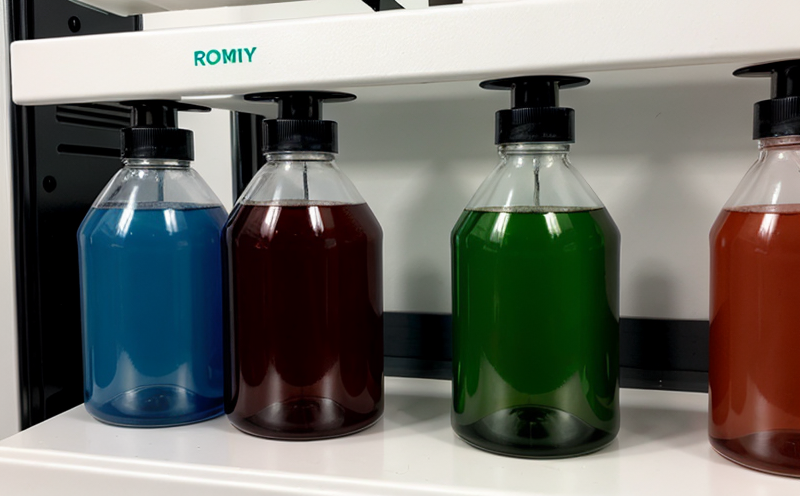JIS K7207 Tensile Reactivity Testing of Thermoplastics
The JIS K7207 tensile reactivity test is a critical procedure used in the polymerization and reactivity testing sector to assess the compatibility between thermoplastic materials under defined conditions. This test is essential for ensuring that different polymers can be safely processed, molded, or assembled without causing undesirable reactions such as decomposition, cross-linking, or other chemical interactions.
The JIS K7207 standard specifies a method to measure the tensile reactivity of thermoplastics at elevated temperatures and pressures. During this test, two specimens are prepared from different polymers. One specimen is coated with the other polymer, and both are subjected to specific temperature and pressure conditions for a specified period. After the testing period, the tensile strength and elongation are measured on each specimen.
The primary purpose of this test is to determine whether one or both materials will react in an adverse manner under industrial processing conditions. If there is significant reactivity, it may lead to product failure during manufacturing or end-use applications. This can result in increased production costs due to scrap, reduced performance, or even safety hazards.
The JIS K7207 test method provides a quantitative measure of the compatibility between two thermoplastics, which helps manufacturers make informed decisions about material selection and processing parameters. By identifying potential reactivity issues early in the development process, companies can avoid costly mistakes further down the line.
It is important to note that this test does not only apply to thermoplastics but also serves as a basis for understanding similar behaviors among other polymer types like elastomers or semi-crystalline polymers. However, certain adjustments may be required based on specific material properties and intended applications.
The JIS K7207 tensile reactivity test is widely recognized within the chemical testing community and is often specified in product specifications and industry standards. Compliance with this standard ensures that products meet quality control requirements and are suitable for their intended uses.
When conducting a JIS K7207 test, it is crucial to follow all prescribed procedures meticulously, including specimen preparation, temperature and pressure settings, duration of exposure, and post-test evaluation methods. Failure to adhere strictly to the protocol may lead to inaccurate results that could mislead decision-makers regarding material compatibility.
In summary, the JIS K7207 tensile reactivity test is a vital tool for ensuring the safe and effective use of thermoplastics in various industries. By providing detailed information about potential reactions between different polymers, this method helps prevent costly errors and promotes safer product development practices.
Benefits
The JIS K7207 tensile reactivity test offers numerous benefits to manufacturers who need assurance that their thermoplastics will perform reliably under expected operating conditions. Some key advantages include:
- Avoidance of Product Failures: By identifying any potential reactivity issues early in the development process, companies can prevent costly mistakes during manufacturing or end-use applications.
- Informed Decision-Making: The test results provide valuable data that helps quality managers and compliance officers make informed choices about material selection and processing parameters.
- Improved Safety: Ensuring compatibility between thermoplastics reduces the risk of chemical reactions leading to product failures, which can pose safety hazards in industrial settings.
- Cost Savings: Early detection of reactivity problems avoids scrap production and ensures that only compatible materials are used in manufacturing processes.
- Better Performance: By selecting thermoplastics with proven compatibility, companies can enhance the overall performance and longevity of their products.
Overall, the JIS K7207 tensile reactivity test plays a crucial role in maintaining high-quality standards across multiple industries where thermoplastics are used extensively.
Customer Impact and Satisfaction
- Informed Supplier Selection: Suppliers who demonstrate compliance with JIS K7207 testing will be seen as reliable partners by buyers seeking to ensure product quality and safety.
- Enhanced Reputation: Successful completion of this test can enhance the reputation of both manufacturers and suppliers, making them more attractive to potential clients or investors.
- Increased Customer Trust: Demonstrating adherence to international standards like JIS K7207 builds trust among customers who value quality and safety in their products.
- Potential for New Markets: Compliance with this standard opens up opportunities to enter new markets where these specifications are required or preferred by local regulations.
Customers benefit greatly from having suppliers that can consistently pass JIS K7207 tensile reactivity tests, as it ensures they receive high-quality materials capable of performing reliably under demanding conditions. This leads to increased customer satisfaction and loyalty, which in turn fosters long-term business relationships.
International Acceptance and Recognition
The JIS K7207 tensile reactivity test enjoys widespread acceptance and recognition across various industries worldwide. It is particularly valued by manufacturers operating within the plastics, chemicals, and automotive sectors due to its stringent requirements and accurate results.
This standard has been adopted as an essential part of many international standards organizations such as ASTM International, European Committee for Standardization (CEN), and others. Its rigorous approach ensures that only materials meeting strict criteria are approved for use in demanding applications.
Many countries have incorporated the principles outlined in JIS K7207 into their national regulations to ensure product safety and quality. For example, Japan, South Korea, Taiwan, and some European nations mandate compliance with this standard when specifying thermoplastics for specific industries.
The international acceptance of the JIS K7207 tensile reactivity test underscores its importance in maintaining high-quality standards globally. By adhering to this method, manufacturers can confidently meet global market demands while ensuring their products are safe and reliable.





